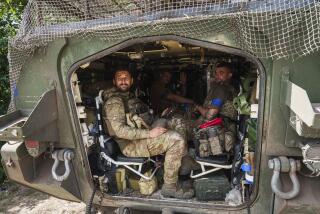Azerbaijani Offensive Reported on Frontier : Nagorno-Karabakh: Muslim republic vows to take back disputed enclave. Armenians say assault is largest armored operation ever in conflict.
- Share via
MOSCOW — Azerbaijanis sang in the streets to celebrate President Ayaz Mutalibov’s resignation and on Saturday launched what Armenia’s leader said were battles along the entire frontier of the disputed Nagorno-Karabakh enclave.
Armenia’s defense minister, Vazgen Sarkisyan, put the number of Armenian dead at 200 or more in the past two days of sharply intensified ethnic warfare. Gegam Bagdasaryan, spokesman for Nagorno-Karabakh’s Parliament, said an assault mounted by the Azerbaijanis to seize one key city was the largest armored operation ever seen in the 4-year-old conflict.
Deeply concerned over the likelihood of future escalation, Armenia’s legislature announced that all men of draft age were being mobilized to defend the “Armenian settlements” of Nagorno-Karabakh, Moscow-based television reported Saturday night.
Two regional centers in the disputed territory, Askeran and Martuni, were bombarded Saturday from Azerbaijani artillery and rocket batteries, Armenian officials said. Five people were reported killed in Martuni.
In Baku, Azerbaijan’s prime minister, Gasan Gasanov, told the Associated Press that despite recent political turmoil, his republic would push ahead with its campaign to retake control of Nagorno-Karabakh. He accused Armenia of fielding a “terrorist army” there.
Mutalibov, the predominantly Muslim republic’s president, was forced to resign Friday night because he had not been able to prevent or avenge what Azerbaijanis charge was the massacre of 1,000 of their countrymen by Armenian fighters in the town of Khojaly on Feb. 25-26.
Armenians claim the casualty figures issued by Baku are hugely inflated and say that they stormed the town because it was being used by Azerbaijani artillery targeting Stepanakert, Nagorno-Karabakh’s capital, a few miles away.
Although insistent that the fertile, mostly agricultural district was an integral part of Azerbaijan despite its mostly Armenian, and hence Christian, population, Mutalibov had been open to negotiations with Armenia. The 53-year-old former Communist Party leader’s abrupt departure therefore had Armenians bracing for an upsurge in armed operations.
“I would like to hope that the new authorities of Azerbaijan will not repeat the mistakes of Mutalibov,” Armenian President Levon Ter-Petrosyan said. “But psychologically, the new authorities, by blaming Mutalibov for his ineffective actions in Nagorno-Karabakh, namely his failure to deport Armenians by force, will start proving that they are capable of that themselves.
“Unfortunately, my fears are coming true,” Ter-Petrosyan told Commonwealth television. “Today, we have battles along the entire border of Karabakh with Azerbaijan.”
As is frequent, Armenian and Azerbaijani versions of the clashes differed starkly, but Dzhovgat Dzhafarov, a correspondent of the Azerbaijani Popular Front’s news agency, confirmed that an offensive had begun to capture Askeran, a town of about 15,000, with the goal of forcing open the way to Khojaly and Stepanakert nearby.
Bagdasaryan, the Nagorno-Karabakh Parliament’s spokesman, said the shelling of Askeran began early Friday, including destructive salvos from multiple-rocket batteries. What followed, he claimed, was the largest attack by armored vehicles ever seen in the conflict, allegedly mounted by the 23rd Division of Commonwealth of Independent States joint armed forces and Azerbaijani infantrymen.
Armenian officials say members of the Nagorno-Karabakh Self-Defense Forces managed to stop the armored column on the outskirts of Askeran and repel the force of 2,000 Azerbaijanis back to the enclave’s border with the Agdam region of Azerbaijan.
The Armenians claimed the Azerbaijanis suffered heavy losses; Dzhafarov, the Azerbaijani Popular Front journalist, mentioned two Azerbaijanis killed.
Fuad Gadzhiev, press secretary at the Azerbaijani mission in Moscow, called the assault on Askeran a “preventive measure” designed to keep the Armenians from seizing the last Azerbaijani settlements of Nagorno-Karabakh.
Armenia’s representative in Moscow, Felix Mamikonyan, told the Russian TV news program “Vesti” that Gadzhiev’s explanation was so illogical that it reminded him of something that Czech writer Karel Capek once wrote as an example of twisted propaganda: “The enemy was viciously shooting at our planes that were peacefully bombing its cities.”
Some Azerbaijani sources even asserted that their fighters had taken Askeran, but withdrew later.
The bombardment of Askeran resumed Saturday morning, police in Nagorno-Karabakh reported. But the press center of the Azerbaijani Popular Front said that Agdam, in Azerbaijan, was also coming under rocket and artillery fire from Askeran. The Armenpress news agency reported that nine tanks and 20 armored infantry fighting vehicles took part in the assault on Askeran and claimed the tanks were driven by Russians.
The Pro-Armenia information agency said the tanks broke off their attack after Mutalibov announced his resignation. It said Commonwealth forces had been trying to help the president remain in power by “making a gift of Askeran to the Azerbaijanis.”
Moscow officials have repeatedly denied that former Soviet armed forces units are taking part in the fighting.
Elsewhere in Nagorno-Karabakh, in the regional center of Mardakert, five people were reported killed in a Friday rocket attack that destroyed 10 homes. The town was said to be bracing for a large-scale Azerbaijani assault.
In another ethnic flash point in the former Soviet Union, Russian-speaking protesters in the breakaway “Dniester Republic” of Moldova blockaded the headquarters of the Commonwealth’s 14th Army early Saturday to demand that troops there side with the Russian minority.
However, the army’s commander refused to allow his soldiers to be dragged into the conflict, and the blockade was lifted.
More to Read
Sign up for Essential California
The most important California stories and recommendations in your inbox every morning.
You may occasionally receive promotional content from the Los Angeles Times.













